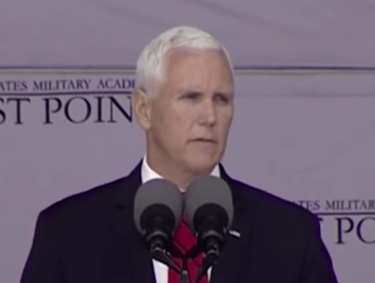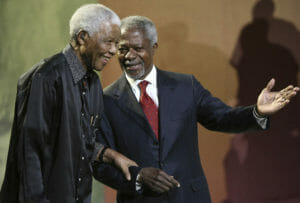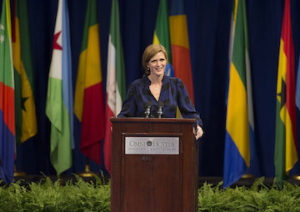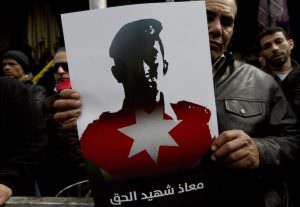Mike Pence’s West Point Address Should Keep Us Awake at Night
The vice president promises graduating cadets that they'll likely see combat. In a functioning democracy, it would have set off alarm bells. Vice President Mike Pence speaks at the United States Military Academy in West Point, N.Y. (YouTube screen grab)
Vice President Mike Pence speaks at the United States Military Academy in West Point, N.Y. (YouTube screen grab)
This piece originally appeared on anti-war.com.
Time was that a stint, or even a career, in the military did not necessarily translate into any serious combat duty. That may seem hard to believe eighteen years after 9/11, but this middle-aged middling major is just old enough to remember such a bygone era. As a cadet at West Point (2001-05), having joined the army just months before the September 11 attacks, most of my professors and tactical officers had never been to war. The colonels had joined in the early 1980s and, at worst, saw limited combat in the petite (and absurd) conflicts in Panama and/or Grenada. The captains and majors commissioned in the early 1990s. As such, most just missed Persian Gulf War 1.0, a few deployed to Somalia or the Balkans, and most hadn’t seen the elephant at all.
Back then, soldiers trained for war but didn’t necessarily expect to fight in one. The Cold War, post-Vietnam army was built as much to contain America’s enemies, and to deter war, as it was to actually engage in combat. Those days seem charmingly quaint from the viewpoint of 2019. Indeed, when I entered the U.S. Military Academy on July 2, 2001, my expectation was to travel the world and maybe do some light peacekeeping in Bosnia or Kosovo, not to fight extended wars. How naive that seems now.
Instead I spent a career training for and deploying to wars across the Greater Middle East. Hell, that’s been the story of my entire generation of soldiers. When I graduated in 2005, this still seemed unique and profound. More than a decade later it’s simply the mundane way of things. So it was, this past week, that Vice President Mike Pence addressed the graduating class at West Point, and reminded them to prepare for ever more war.
The content of this bellicose, and banal, speech should have been remarkable; it should have raised Americans’ collective “spidey-sense.” Instead, hardly anyone noticed that Pence, like a Punxsutawney groundhog, was veritably predicting many more years of winter (read: warfare). Still, the vice president’s oratory was disturbing on a number of levels.
First off, he bragged about President Trump’s absurd military budget and explained that the cadets should be honored to join “an Army that’s better equipped, better trained, and better supplied than any United States Army in the history of this country.” Evidence for such an assertion was glaringly absent, and none in the audience had the opportunity to ask why this unsurpassed army hasn’t won a single war in this century. Also absent was any discussion of the tradeoffs inherent in ballooning defense spending, the opportunity costs of such largess, or an explanation as to why the US spends more on its military than the next seven nations combined. And why should he have brought any of this up? Defense spending is politically popular; it’s the one type of public outlay that draws essentially no criticism.
Next, Pence engaged in some genuine truth-telling that revealed the nature of military service in a time of forever war. He informed the cadets that “It is a virtual certainty that you will fight on a battlefield for America at some point in your life. You will lead soldiers in combat. It will happen.” This should have been a controversial statement, an alarming prophecy of perpetual war. Only in 2019 that’s the norm for military members and their families. They should expect combat, because almost no mainstream political figures demonstrate the capacity or intent to reign in the American war machine.
Pence went further, though, and actually listed out where these newly minted officers should expect to fight. Sure he listed the usual suspects – “Some of you will join the fight against radical Islamic terrorists in Afghanistan and Iraq” – so apparently the war on terror will roar on indefinitely. However, Pence also listed a few other places where the young officers will join “the fight,” including the “Korean peninsula,” the South China Sea, and Europe (against “an aggressive Russia”). Mind you, there are – as of yet – no actual shooting wars in any of these locales, thus labeling them ongoing “fights” is both provocative and irresponsible.
Nevertheless, the true surprise, and most distressing of all, was the VP’s casual assertion that “some of you may even be called upon to serve in this hemisphere.” This was a clear reference to Venezuela, Washington’s stated policy of regime change there, and to the recent kick off of Cold War 2.0 with what John Bolton labeled the “troika of tyranny” – Venezuela, Cuba, and Nicaragua. Never mind that not a single one of these tinpot tyrannies presents a significant threat to the US, Pence still gleefully paraded the old ghost, and villain, of “socialism.” It was all so 1980s!
Pence’s retro foreign policy, and outrageously pugnacious rhetoric befit the actions of an empire, not a republic. His casual assumption that today’s young graduates – most of whom were kindergarteners on 9/11 – will see combat in both ongoing and future wars reflects life in an increasingly militaristic and unhinged society. That such crazy is so routine is even more problematic.
The normalization of war can be just as detrimental to a republic as war itself. The barbarians are not at the gates, folks. War is not a foregone conclusion or a national necessity. Each successive occupant of the White House only needs you to believe that in order to centralize the power of an increasingly imperial presidency, stifle dissent, and chip away at what remains of civil liberties.
Seen in its proper context, Pence’s speech would have raised alarm bells in a healthy, functioning republic. But America in 2019 is far from that. Instead, the VP’s staggeringly absurd speech registered as barely a blip on the media’s 24-hour news cycle. After eighteen years of perpetual conflict, members of the military, and the populace at large, have grown immune to the inertia of war. As such, the republic’s bleeding is internal, as American Democracy dies a slow, opaque death from the inside out. It may be too late to reverse course, and one wonders if a distracted and apathetic public even notices.
Danny Sjursen is a retired U.S. Army officer and regular contributor to Antiwar.com. His work has appeared in the LA Times, The Nation, Huff Post, The Hill, Salon, Truthdig, Tom Dispatch, among other publications. He served combat tours with reconnaissance units in Iraq and Afghanistan and later taught history at his alma mater, West Point. He is the author of a memoir and critical analysis of the Iraq War, “Ghostriders of Baghdad: Soldiers, Civilians, and the Myth of the Surge.” Follow him on Twitter at @SkepticalVet.
Copyright 2019 Danny Sjursen
Your support matters…Independent journalism is under threat and overshadowed by heavily funded mainstream media.
You can help level the playing field. Become a member.
Your tax-deductible contribution keeps us digging beneath the headlines to give you thought-provoking, investigative reporting and analysis that unearths what's really happening- without compromise.
Give today to support our courageous, independent journalists.









You need to be a supporter to comment.
There are currently no responses to this article.
Be the first to respond.